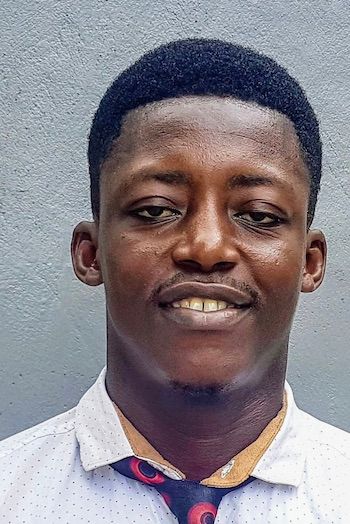Ibrahim Alimammy Kamara

Summary: Ibrahim Alimammy Kamara was kidnapped and forced to fight in a civil war when he was only seven years old. Later, living in a slum and noticing children roaming around the area and not attending school, he brought them into his makeshift home and offered them basic education. Kamara eventually used his own scant resources to found several organizations that help to alleviate poverty, shelter people from constant flooding, and provide education, mentoring, food, and supplies. Fighting criticism for his ideals, insufficient funds and a poor infrastructure makes for a harrowing existence.
Profile: Ibrahim Alimammy Kamara had a rough childhood. When he was only seven years old, he—along with his father—was captured by Sierra Leone rebels; he was forced to fight as a “Child Combatant” in a long, brutal civil war. Years later, he found himself living in a slum; moreover, he realized that most of the children in the area were not going to school; they were roaming around with seemingly little purpose.
“I said to myself that I will not want these kids to go through what I experienced,” remembers Kamara. “I must do something about it.”
And he did. He began sharing his makeshift home with some of the children and spending a good portion of his day giving them basic education. Flooding, which was common in that part of Sierra Leone—the country is the third most vulnerable to floods in the world—made the circumstances even more dire.
But Kamara persisted—in many ways. He became a member of IEARN, the International Education and Resources Network, which encourages students to participate in global projects. He began running a school in the slums of Freetown—the Empowering Children School—which focuses on childhood development, mentorship, and agriculture. He also started SHARP, the Safe Haven Adaptive Response Program, which helps poor people—particularly children and women—whose lives have been devastated by floods: “The goal,” says Kamara, “was to provide items that would help survivors who were wet and cold with their desperate need to get dry after everything they owned had been taken from them by the flood.” SHARP provides food, dry clothing, bed sheets, and temporary shelter.
Kamara has done all this using his own scant resources and funds from very small businesses. He continually seeks financial support, and it’s not easy. For example, many people in Sierra Leone chastise him by pointing to his plan to relocate residents displaced by floods as “unrealistic” and “not achievable”. They are not donors.
The plight of many Sierra Leone citizens remains severe. Kamara: “They face hunger, outbreaks of disease, and shelter challenges. Flooding happens multiple times each year. Families lose all their possessions, children lose their school uniforms and supplies, and the small trading businesses are lost.”
Fighting criticism, insufficient funds, a poor infrastructure, and severe climate events makes for a harrowing existence. Kamara is motivated, though: “What drives me most is passion and love to help humanity and our planet.”
And his goal? “I want to leave a well-educated generation by which it would be a slum-free society, where every day would begin with jobs and opportunities. Everyone would be able to live a decent life. With that there would be no poverty and no hunger.”
Despite huge and constant obstacles, Ibrahim Kamara remains dedicated to pursuing that goal.
